- Home
- Don DeLillo
Zero K Page 7
Zero K Read online
Page 7
“One of them drank kerosene or gasoline.”
“They sit in lotus position or run through the streets. A burning man running through the streets. If I saw such a thing, firsthand, I would run with him. And if he ran screaming, I would scream with him. And when he collapsed, I would collapse.”
The sweatshirt was black, sleeves protruding from the cloak. He placed his fork on the plate and sat back. I stopped eating and waited. He could have been sitting in a weary café in a lost corner of some large city, an eccentric figure of the type who is left alone by others, a man often seen but nearly never spoken to. What’s his name? Does he have a name? Does he know his name? Why does he dress that way? Where does he live? A man warily regarded by those few who’ve heard him deliver a monologue on one or another subject. Deep voice, unslurred, interior, and remarks too scattered to warrant a sensible response.
But the Monk wasn’t that man, was he? The Monk had a role here. He spoke to men and women who’d been placed in a shelter, a safehold, people in the last days or hours of the only life they’d ever known, and he had no illusions about the sweeping promise of a second life.
He looked at me and I knew what he saw. He saw the figure of a man hunched sort of sideways in a chair. The look told me nothing more than that. The food I was chewing told me it could conceivably be meat.
“I needed to do something, do more than pledge to run alongside, do more than say something or wear a certain garment. How do we stand with others when the things that separate us are imposed at birth, when the separation haunts us and follows us day and night?”
His voice began to carry a storytelling tone, a sense of recitation, self-remembrance.
“I decided to make a journey to the sacred mountain in the Tibetan Himalayas. A great white icy pyramid. I learned all the names of the mountain in all the languages. I studied all the histories and mythologies. It took many days of hard travel just to reach the area, well over a week, finally, the last day on foot. Masses of people arriving at the base of the mountain. People crowded into open trucks with bundled possessions hanging from the sides and people tumbling out and milling about and looking up. There’s the summit washed in ice and snow. The center of the universe. People with yaks to carry supplies and tents. Tents pitched everywhere. Prayer flags draped everywhere. Men with prayer wheels, men in woolen face masks and old ponchos. All of us here to make the circumambulation of the high rim at five thousand meters. I was determined to follow the trail in the most demanding manner. Take one step and then fall to the ground in body-length prostration. Rise to my feet, take one step, then fall to the ground in body-length prostration. It would take days and then weeks, they told me, for someone not raised and trained in the age-old practice. Thousands of pilgrims every year for two thousand years, walking and crawling beneath the summit. Blizzards in June. Death in the elements. Take one step, then fall to the ground in body-length prostration.”
He spoke about levels of devotional stillness, states of meditation and enlightenment, the fragile nature of their rituals. Buddhists, Hindus, Jains. He wasn’t looking at me now. He looked at the wall, spoke to the wall. I sat with fork in hand, suspended between the plate and my mouth. He spoke about abstinence, continence and tantric bliss and I looked at the meatlike specimen at the end of my fork. This was animal flesh that I would chew and swallow.
“I had no guide. I had a yak to carry my tent. Thick brown hairy thing. I kept looking at it. All brown and shaggy, a thousand years old. A yak. I sought advice on whether I should make the trek in clockwise or counterclockwise fashion. There are codes of conduct. The distance would be fifty-two kilometers. Uneven terrain, altitude sickness, snow and fierce wind. Take one step and fall to the ground in body-length prostration. I carried bread, cheese and water. I ascended the main path. I saw no Westerners, there were no Westerners. Men wrapped in horse blankets, men in long robes, men with little wooden shoes fitted to their hands, clogs fitted to their hands to protect against the pebbles and stones as they crawled. Reach the level of circumambulation. Follow the rocky trail. One step or stride and fall to the ground. Body-length prostration. I stood outside my tent and watched them walk and crawl. It was methodical work. They were not showing fervor and holy emotion. They were simply determined, faces and bodies, doing what they’d come here to do, and I watched. There were others standing and resting, others talking, and I watched. I intended to do this, fall to my knees, stretch full-length on the ground, make a mark in the snow with my fingers, speak several meaningless words, inch ahead to the mark made by my fingers, rise to my feet, take a breath, take a step, then fall to my knees again. Parts of my body would lose all feeling in the cold and cutting wind. Those who aspire to total emptiness. Those with foreheads forever cut and bruised from bending to the earth, from kneeling and bowing down and striking the earth. I intended to do this, take a step, fall to my knees, bow to the earth, inch ahead to the mark made by my fingers, speak several nonwords for every step I take.”
He kept reminding himself what he’d hoped to do and the repetition was beginning to sound stressed. Could the words reframe the memories? He stopped speaking but kept remembering. I could see him outside his tent, tall man, bareheaded, shrouded in layers of castoff clothing. I knew I wasn’t meant to ask whether he’d managed to crawl for an hour or a week. But I responded to the act itself, the principle of it, the man’s intentions, so far outside my own fragmented visions, a thing for others, blunt and punishing and filled with steep traditions and simple reverence.
In time he resumed eating and so did I. It occurred to me that my sensitivity to the meat on my fork was completely phony. I didn’t feel guilty, even if it was yak meat. I chewed and swallowed. I was beginning to understand that every act I engaged in had to be articulated at some level, had to be performed with the words intact. I could not chew and swallow without thinking of chew and swallow. Could I blame the Stenmark twins? Maybe I could blame the room, my room, the introspective box.
He looked at me again.
“The thinness of contemporary life. I can poke my finger through it.”
Then he looked past me and stood with glass in hand and took a last swallow before returning the glass to the table and walking toward the door. I glanced over my shoulder to see a man in the doorway wearing a soccer jersey and sweatpants. The Monk followed him out and I pushed away my table and followed them both.
Pure impulse allows the body to do the thinking. The Monk was aware of my action but said nothing. At the end of the second long hall the escort turned and saw me and he and the Monk exchanged remarks in what I took to be one of the Turkic languages of the region. Then the escort gestured for me to lift my arm waist-high and he took a small pointed instrument from a narrow pocket in his trousers and touched it to the disk on my wristband. I took this to mean that I could now gain admission to areas previously restricted.
We three entered an enclosure and as the access door slid shut behind us I became faintly aware of motion that may have been horizontal, a whispered glide at a speed that I could not estimate. Time seemed also beyond my ability to measure. There was a sense of temporal blur and it could have been seconds or possibly minutes before we were inserted into a vertical shaft, proceeding downward, so I imagined, into the numbered levels. The effect was a free-floating sensation, nearly out-of-body, and if the two others spoke I didn’t hear them.
A paneled door opened and we walked down a passageway into a large low shadowed space. It was almost librarylike, with rows of partitioned cubicles or stalls similar to carrels for private study. The Monk paused here, then reached back over his shoulder for the black hood, the sweatshirt hood, fitting it snugly over his head. I decided to interpret this as a ceremonial moment.
I followed him down several steps into the array of carrels and saw that they held patients rather than students, people seated or strapped upright, others lying face up and utterly still, eyes opened, eyes closed, and empty carrels as well, a fair number. This was the
Monk’s workplace, the hospice, and I went where he went, along a network of aisles, with carrels on either side. I could make out the texture of the nearest wall, coarse-grained, in neutral colors, bands of black and gray swabbed on, intermixed, and the scant lighting and low ceiling and huddled men and women, the general dimensions of the area, and I could not find a category, something Stenmarklike to attach to the setting.
I looked at the patients in their chairs or beds, which were neither chairs nor beds. They were a kind of padded stool or soft bench and it wasn’t easy to tell which individuals were asleep, which were tranquilized, which under the influence of anesthesia at one or another level. At times, here and there, an individual looked completely and full-bloodedly aware.
The Monk stopped at the end of the aisle we were in and turned toward me just as I turned the other way to check on the presence of our escort, who was not there.
“We’re waiting,” he said.
“Yes, I understand.”
What did I understand? That I was feeling hemmed in, close to being trapped, and I asked the Monk about his prevailing frame of mind, the disposition he experienced when he was here.
“I don’t have a disposition.”
I asked him about the stalls, the carrels.
“I call them cribs.”
I asked him what we were waiting for.
“Here they come,” he said.
There were five individuals in dark smocks, two with shaved heads, moving along the aisles in our general direction. They were attendants or orderlies or paramedics or escorts. They stopped at a nearby carrel, two of them checking devices on the headboard, one of them speaking to the patient. Three of the individuals then led the departure, single-file, and the two bald orderlies pushed the wheeled carrel along behind them. I thought of the other patients and tried to imagine the tense anticipation they felt, their turns coming, as they watched this odd troop proceed along the aisle and into shadow.
When I turned toward the Monk he was already engaged with the person in a nearby carrel. It was a woman, seated, and he spoke to her quietly in what I took to be a rambling sort of Anglo-Russian, leaning close, his hands folded over hers. The words were an effort for him to summon but the woman’s head bobbed in response and I knew it was time for me to leave the man to his task.
The Monk in his old rutted cloak, his scapular.
I wandered for a while, expecting to be stopped. I thought I might talk to someone among the bodies-in-waiting. No sign of attendants giving massages or monitoring heart rates and no sound of therapeutic music. I began to think I’d blundered my way into a half-empty warehouse of bodies, barely an eye blinking or a finger twitching.
I realized I was shivering. It was only a slight tremble but it made me look around and then up and down, dumbly, seeing the same neutral tones in all directions, states of gray, modest and somber, in-between, the ceiling lower here, the lighting dimmer, and maybe it was a bomb shelter that the Stenmarks had in mind.
I walked along the aisles glancing at the few patients in this sector. I thought the word itself was all wrong. But what were they if they weren’t patients? Then I thought of the words that Ross had used in his description of the prevailing tone here. Reverence and awe. Is this what I was seeing? I saw eyes, hands, hair, skin tone, facial configuration. Races and nations. And not patients but subjects, submissive and unstirring. I stood before a sedated woman wearing eye shadow. I did not see peace, comfort and dignity, only a person under the authority of others.
I stopped alongside a robust man seated in his carrel. He wore a knit shirt and resembled a fellow on a golf course plunked down in his cart. I stood in front of him and asked how he was feeling.
He said, “Who are you?”
I told him I was a visitor eager to be educated. I said he looked pretty healthy. I said I was curious about the time he’d spent here and how much longer it would be before he was taken wherever they would take him.
He said, “Who are you?”
I said, “Don’t you feel the chill, the damp air, the tight space?”
He said, “I’m looking right through you.”
Then I saw the boy. I knew at once that it was the same kid I’d seen in a motorized wheelchair in one of the hallways, accompanied by two hollow-bodied escorts. Here, he was seated in a carrel, shiny and very still, positioned almost sculpturelike, contrapposto, head and shoulders twisted one way, hips and legs the other.
I didn’t know what to say. I said my name. I spoke to him softly, careful not to crowd him. I asked him how old he was and where he was from.
Head turned left, eyes swiveling up and to the right, where I was standing. He seemed to be thinking his way into my presence here, possibly even remembering our momentary encounter. Then he began to speak, or to produce what sounded like random noise, a series of indistinct sounds that were not mumbled or stuttered but only, somehow, broken. He was expressing his thoughts but I wasn’t able to detect a trace of any known language, or a nuance of meaning, and he showed no awareness that he could not be understood.
He was motionless except for his mouth and eyes and I moved to a point where he did not have to stretch his range of vision. I did not speak again but only stood and listened. And I did not try to guess his country of origin, or who had brought him here, or when he would be taken to the chamber.
The only thing I did was take his hand and wonder how much time remained to him. In his physical impairment, the nonalignment of upper and lower body, in this awful twistedness I found myself thinking of the new technologies that would one day be applied to his body and brain, allowing him to return to the world as a runner, a jumper, a public speaker.
How could I fail to consider the idea, even in my deep skepticism?
I don’t know how long I remained. When he stopped speaking, abruptly, and dropped into immediate sleep, I lifted my hand from his and went looking for the Monk.
I made my way through the sector and was relieved to see the Monk standing and gesturing above someone’s carrel and it occurred to me that I might give him a name, as I’d done with the speakers in the stone room. But a name, in his case a fictitious birth name, would be dead weight. He was the Monk and he was addressing the subjects, one by one, in their carrels, their cribs.
I thought of the boy. I realized it was the boy that I should have named. It would not have helped me interpret his speech, the sounds that bounced out of him, but I would have perceived something as I listened, a fragment of identity, a tiny shaping element to ease the questions that whirled about him.
I stood near the Monk and tried to listen to what he said to those he approached. At one point, in Spanish, he told an elderly woman that she was blessed to be lying here, in peace, and to be thinking about her mother, who had been spread-bodied, in pain, to give birth to her. I was able to understand this but not everything he said to everyone until he told a middle-aged man, in English, that the place where he would reside, in a preserved state, was very deep in the earth—deeper still than this cloistered hall. Possibly even safe from world’s end. The Monk spoke enthusiastically about world’s end.
The Monk in his sweatshirt hood, his cowl.
We walked together toward the passageway where we’d entered and I asked him several questions about the procedures here.
“This is the safehold, the waiting place. They’re waiting to die. Everyone here dies here,” he said. “There is no arrangement to import the dead in shipping containers, one by one, from various parts of the world, and then place them in the chamber. The dead do not sign up beforehand and then die and then get sent here with all the means of preservation intact. They die here. They come here to die. This is their operational role.”
This is all he had to say. When we entered the enclosure from which we’d be delivered to our level, there was no sign of our escort and the Monk showed no interest in waiting for him to appear. In our soft ascent I began to understand what this meant, that there was no one, at least for now, wh
o might return the disk on my wristband to its restrictive function.
I said nothing, the Monk said nothing.
When I walked into my room I looked at whatever there was to see and touch and then I spoke the word for each thing. There was a bottle of hand sanitizer in the pygmy bathroom that hadn’t been there before and this messed up my immersion in the plain words for the familiar objects. I looked in the mirror over the sink and said my name aloud. Then I went looking for my father.
- 8 -
Ross wasn’t in the office he’d been using. Nothing was in the office. Desk and chairs gone, computer equipment, wall charts, standing tray with glasses gone, whiskey bottle gone. This was briefly unsettling but then not so strange. The time was near for Artis to be taken down and for Ross to be returning to the world he’d made.
I went to the suite expecting to see Artis in her chair, in robe and slippers, hands folded in lap. What would I say to her and how would she look, thinner, paler, and would she be unable to speak to me or to see me sitting there facing her?
But it was my father in the chair. I had to pause to assemble the information, Ross barefoot in a T-shirt and designer jeans. He didn’t look at me when I entered but simply noted a figure wandering into his line of vision, another presence in the room. I sat on the bench nearby, facing him as I’d faced her, only, now, feeling regret over the fact that I’d missed seeing her one last time.
“I thought you’d let me know.”
“It hasn’t happened.”
“Again. Hasn’t happened again. Where is she?”
“In the bedroom.”
“And it will happen tomorrow. Is that what you’re going to tell me.”
I got up and walked over to the bedroom door and opened it and there she was, in bed, under the covers, eyes opened. Her hands rested above the blanket and I approached slowly and took one hand and held it and then waited.
She said, “Jeffrey.”

 Great Jones Street (Contemporary American Fiction)
Great Jones Street (Contemporary American Fiction)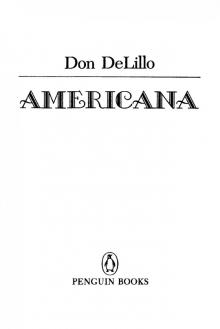 Americana
Americana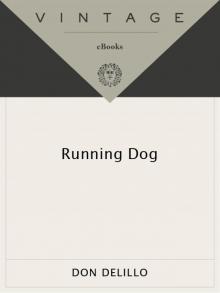 Running Dog
Running Dog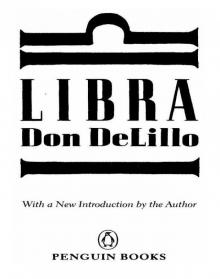 Libra
Libra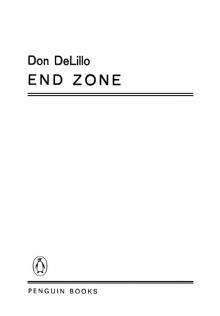 End Zone
End Zone Ratner's Star
Ratner's Star Underworld
Underworld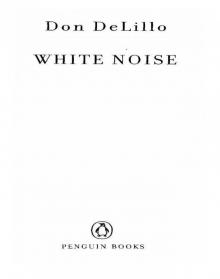 White Noise
White Noise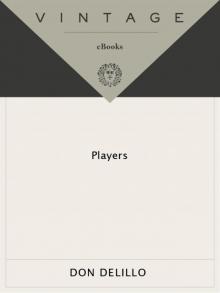 Players
Players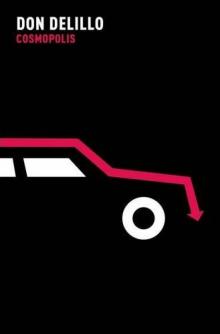 Cosmopolis
Cosmopolis The Silence
The Silence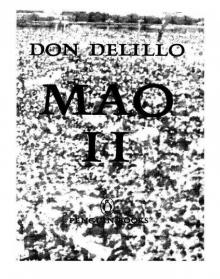 Mao II
Mao II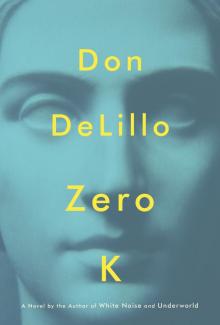 Zero K
Zero K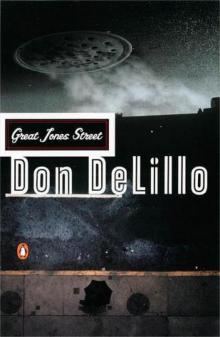 Great Jones Street
Great Jones Street The Angel Esmeralda
The Angel Esmeralda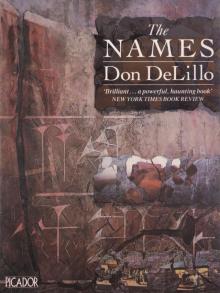 The Names
The Names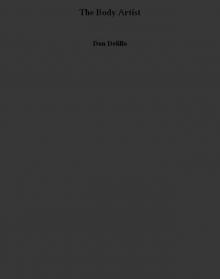 The Body Artist
The Body Artist Point Omega
Point Omega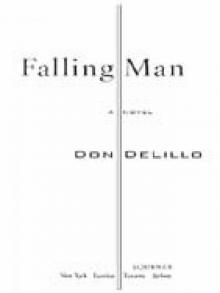 Falling Man
Falling Man